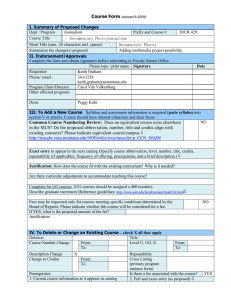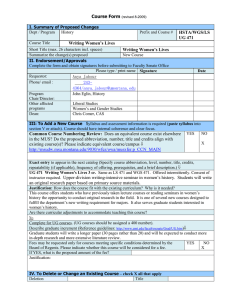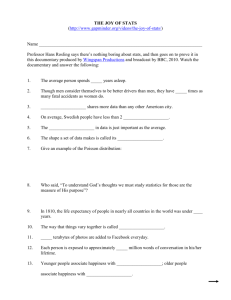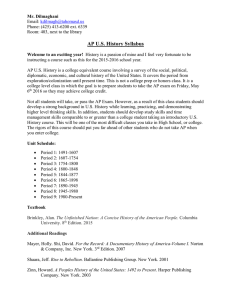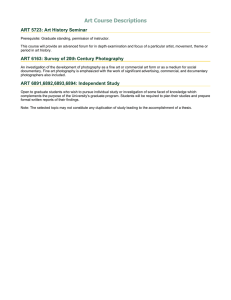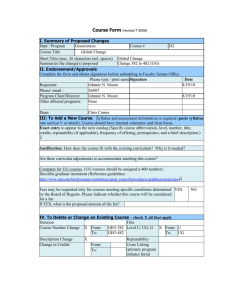Course Form
advertisement
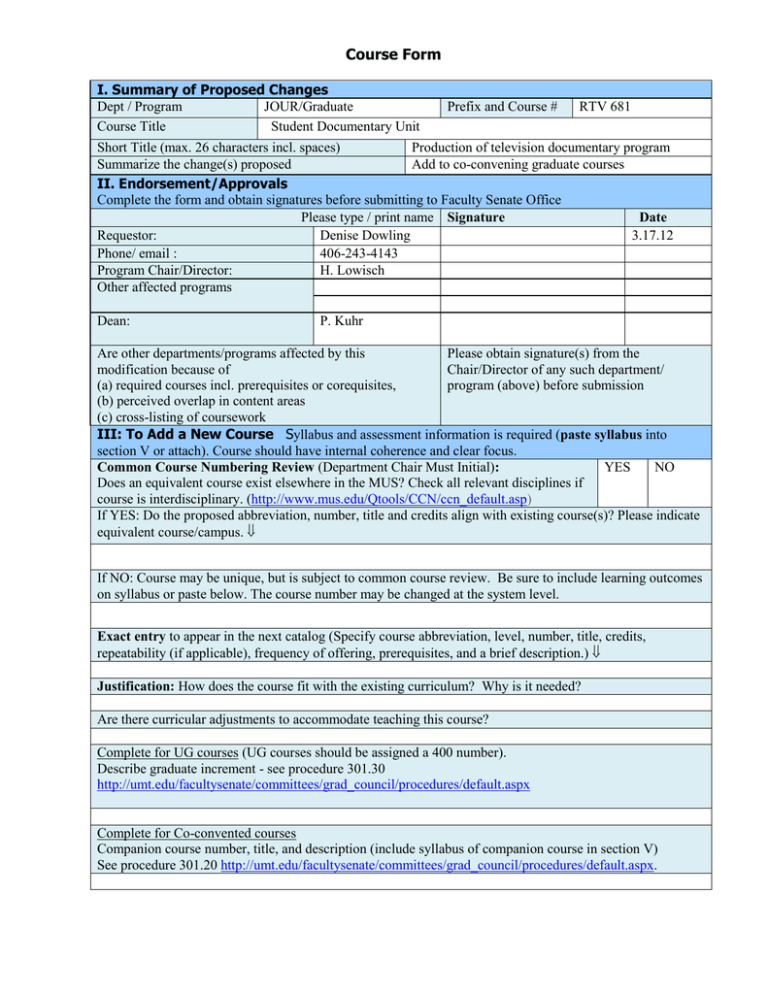
Course Form I. Summary of Proposed Changes Dept / Program JOUR/Graduate Course Title Student Documentary Unit Prefix and Course # RTV 681 Short Title (max. 26 characters incl. spaces) Production of television documentary program Summarize the change(s) proposed Add to co-convening graduate courses II. Endorsement/Approvals Complete the form and obtain signatures before submitting to Faculty Senate Office Please type / print name Signature Date Requestor: Denise Dowling 3.17.12 Phone/ email : 406-243-4143 Program Chair/Director: H. Lowisch Other affected programs Dean: P. Kuhr Are other departments/programs affected by this Please obtain signature(s) from the modification because of Chair/Director of any such department/ (a) required courses incl. prerequisites or corequisites, program (above) before submission (b) perceived overlap in content areas (c) cross-listing of coursework III: To Add a New Course Syllabus and assessment information is required (paste syllabus into section V or attach). Course should have internal coherence and clear focus. Common Course Numbering Review (Department Chair Must Initial): YES NO Does an equivalent course exist elsewhere in the MUS? Check all relevant disciplines if course is interdisciplinary. (http://www.mus.edu/Qtools/CCN/ccn_default.asp) If YES: Do the proposed abbreviation, number, title and credits align with existing course(s)? Please indicate equivalent course/campus. If NO: Course may be unique, but is subject to common course review. Be sure to include learning outcomes on syllabus or paste below. The course number may be changed at the system level. Exact entry to appear in the next catalog (Specify course abbreviation, level, number, title, credits, repeatability (if applicable), frequency of offering, prerequisites, and a brief description.) Justification: How does the course fit with the existing curriculum? Why is it needed? Are there curricular adjustments to accommodate teaching this course? Complete for UG courses (UG courses should be assigned a 400 number). Describe graduate increment - see procedure 301.30 http://umt.edu/facultysenate/committees/grad_council/procedures/default.aspx Complete for Co-convented courses Companion course number, title, and description (include syllabus of companion course in section V) See procedure 301.20 http://umt.edu/facultysenate/committees/grad_council/procedures/default.aspx. New fees and changes to existing fees are only approved once each biennium by the Board of Regents. The coordination of fee submission is administered by Administration and Finance. Fees may be requested only for courses meeting specific conditions according to Policy 940.12.1 http://mus.edu/borpol/bor900/940-12-1.pdf . Please indicate whether this course will be considered for a fee. If YES, what is the proposed amount of the fee? Justification: YES NO IV. To Delete or Change an Existing Course – check X all that apply Deletion Title Course Number Change From: Level U, UG, G x From: Co-convened To: To: Description Change Change in Credits Prerequisites Add co-convening designation From: To: Consent of Instructor 1. Current course information at it appears in catalog (http://www.umt.edu/catalog) G 681 Graduate Documentary 3 cr. Offered spring. Prereq., Jour 650 or Consent of instr. Students conceive, research, report, photograph and edit a one-hour documentary for Montana PBS in tandem with students in R-TV 481. Repeatability Yes Cross Listing (primary program initiates form) Is there a fee associated with the course? 2. Full and exact entry (as proposed) G 681 Graduate Documentary 3 cr. Offered spring. Prereq., Consent of instr. Students conceive, research, report, photograph and edit a one-hour television documentary for Montana PBS. Co-convenes with RTV U481. 3. If cross-listed course: secondary program & course number 4. If co-convened course: companion course number, title, and description (include syllabus of companion course in section V) See procedure 301.20 http://umt.edu/facultysenate/committees/grad_council/procedures/default.aspx. The University of Montana School of Journalism - Department of Radio-Television Student Documentary Unit-RTV 481 Spring 2012 - 3 semester credits CRN 34796 / 31799 Tu/Th 9:40 – 11:00a--DAH 316 Syllabus - Subject to Change Instructors Denise Dowling Assistant Professor Radio-Television Department DAH 407 Missoula, MT 59812 Yes (406) 243-4143 denise.dowling@mso.umt.edu Office Hours: M-F 11-12 or by appointment Kagan Yochim Adjunct Lecturer Radio-Television Department DAH 433 Missoula, MT 59812 Office: (406) 243-6950 Cell: (406) 240-2800 kagan.yochim@mso.umt.edu Office Hours: T/Th 11-12 or by appointment Course Description: This course will examine different forms used in documentary production and the concepts used for producing a 60-minute program for broadcast in the spring/summer. In addition, this course will emphasize contemporary documentary techniques, research methodology, planning production, interviewing skills, video shooting, script writing, and post-production video editing graphic design and finishing. Students will work in teams participating in critical decisions while creating the documentary program. The final production may air on MontanaPBS. Students will work in teams assigned to produce a section of the finished documentary program. In addition to these specific roles, each member of the team will fully participate in the filmmaking process – everything from researching and conceptualizing the project, filling crew positions on shoots, to logging and importing shot footage and critically reviewing the editorial progress. ATTENDANCE AND WORKLOAD: If you are not excused, you are required to attend all class sessions. If illness or an emergency prevents you from attending, telephone one of the professors BEFORE CLASS. Unexcused absences will affect student grades. It will be extremely challenging to produce a quality 60-minute documentary in 3 ½ months. This will require extraordinary teamwork and a major commitment of time inside and outside of class to plan, shoot and edit the film. In addition, students will be required to watch select documentaries and contribute to a discussion of them during class time. Please note: you may not submit any assignment that has previously, or will be concurrently, submitted for another class, unless you receive prior approval from the professor for this course. To do so without permission will result in an F for the assignment and could result in an F for the course. Course Objectives The successful student in RTV 481 will: Recognize different processes involved in documentary making Identify various authorial intentions associated with genre Understand and work for an audience Effectively pitch your ideas Develop & implement a plan for shooting, writing/editing and finishing a long-form broadcast production Understand the financial objectives of video production Manage a budget Develop interview techniques Research archival materials Catalogue field video Capture & edit video Manage video storage and organization Create a clean soundtrack Present your work-in-progress and completed work Critique and assess your own work-in-progress; accept others’ critiques Work in collaboration Explore alternative delivery systems for finished product Understand and execute effective promotion through various media platforms including social media GRADES: a grade and/or critical feedback will be given for each assignment. The final grade will reflect critical evaluation of individual projects, energy and consistency of effort, contribution to discussions, amount and quality of work during the semester and attendance. The following is a breakdown of grading percentages: Student’s specific duties for team assignment 35% Completed documentary section 30% Peer evaluation 10% Class participation/Teamwork 15% Other assignments 10% A 100-93% A- 92-90% B+ 89-88% B 87-83% B- 82-80% C+ 79-78% C 77-73% C- 72-70% D+ 69-68% D 67-63% F Below 63% Same Work for Multiple Classes in J-School: You may not submit for this course any assignment that has previously or will be concurrently submitted for another class unless you receive prior approval from the professor for this course. To do so without permission will result in an “F” for the assignment and could result in an “F” for the course. Academic Honesty: All students must practice academic honesty. Academic misconduct is subject to an academic penalty by the course instructor and/or a disciplinary sanction by the University. All students need to be familiar with the Student Conduct Code. The Code is available for review online at http://www.umt.edu/SA/VPSA/index.cfm/page/1321. Accommodations for Students with Disabilities: This course is accessible to and usable by otherwise qualified students with disabilities. To request reasonable program modifications, please consult with the instructor. Disability Services for Students will assist the instructor and student in the accommodation process. For more information, visit the Disability Services website at www.umt.edu/dss/. After Hours Access: For after hours access to Don Anderson Hall, complete and submit this form online: http://jour.umt.edu/after-hours/ by Wednesday, February 1st. Students who miss the deadline WILL NOT BE ALLOWED AFTER HOURS ACCESS. Complete only one request form per semester – be sure to list all courses you are taking. Codes will remain active until the last day of the semester. 5. Is this a course with MUS Common Course Numbering? http://www.mus.edu/Qtools/CCN/ccn_default.asp If yes, please explain below whether this change will eliminate the course’s common course status. 6. Graduate increment if level of course is changed to UG. Reference procedure 301.30: http://umt.edu/facultysenate/committees/ grad_council/procedures/default.aspx (syllabus required in section V) 7. Other programs affected by the change 8. Justification for proposed change NO Have you reviewed the graduate increment guidelines? Please check (X) space provided. Student Documentary is a project course, with a team of 12-18 students creating a one-hour television program for air on MontanaPBS and other outlets. Our Master’s Program is too small (ca. 8 students per year) to be able to create a program of this depth solely with graduate students. To have graduate and undergraduate students work together on producing the program is thus the only opportunity for our graduate students to participate in documentary program work. That’s why we’ve always offered a graduatelevel version of the student documentary. Pursuant to the new Graduate Council guidelines, we are now seeking a co-convening designation for RTV 681. As required, the syllabus for RTV 681 course represents more extensive student learning outcomes and a higher degree of rigor, parallel to the other graduate courses in the same program. It accords extra work to graduate students, by putting them in managerial positions and requiring them to complete a budget, a promotions plan and manage fellow students, while the undergrads will not be required to tackle those projects. It provides for the graduate student(s) to meet separately with the instructor each week. Please see passages highlighted in graduate course syllabus below. V. Syllabus/Assessment Information (must include learning outcomes) Required for new courses and course change from U to UG. Paste syllabus in field below or attach and send digital copy with form. The University of Montana School of Journalism - Department of Radio-Television Missoula, MT 59812-6480 Student Documentary Unit (RTV 681) CRN: 33392 Spring 2010 - 3 semester credits TuTh 9:40 – 11a-Additional Hour per week by appointment DAH 316 Syllabus - Subject to Change SPRING 2010 Updated 12/21/09 Instructors Denise Dowling Associate Professor Radio-Television Department DAH 407 Missoula, MT 59812 (406) 243-4143 office (406) 251-0357 home denise.dowling@mso.umt.edu Office Hours: T/Th 11a-12p or by appointment Gita Saedi Kiely Adjunct Lecturer gita.saedi@umontana.edu (406) 239-5034 cell (406) 243-2237 office RTV435 Office Hours: T/Th 9-9:40a Course Description: This course will examine different forms used in documentary production and the concepts used for producing a 60-minute program for broadcast in the spring/summer. In addition, this course will emphasize contemporary documentary techniques, research methodology, planning production, interviewing skills, videotape shooting, script writing, and post-production videotape editing and finishing. Students will work in teams participating in critical decisions while creating the documentary program. The final production may air on Montana PBS. Students will work in teams assigned to produce a section of the finished documentary program. Each team is comprised of a producer, director, videographer, and editor. In addition to these specific roles, each member of the team will fully participate in the filmmaking process – everything from researching and conceptualizing the project, filling crew positions on shoots, to logging and digitizing shot footage and critically reviewing the editorial progress. Objectives: Skills to be developed Recognize different processes involved in documentary making Identify various authorial intentions associated with genre Critique and assess documentary work-in-progress Effectively pitch your ideas Plan shooting schedule, deliverables and estimated budget Manage and oversee budget Develop interview techniques Research archival materials Plan and oversee organization of field material Teach one or more classes on ethics in documentary work Present your work-in-progress and completed work Work in collaboration while leading undergraduates Explore alternative delivery systems for finished product Lead the promotional effort for the class including legacy, social and emerging media Attendance and Workload If you are not excused, you are required to attend all class sessions. If illness or an emergency prevents you from attending, telephone one of the professors BEFORE CLASS. Unexcused absences will affect student grades. It will be extremely challenging to produce a quality 60-minute documentary in 3 ½ months. This will require extraordinary teamwork and a major commitment of time inside and outside of class to plan, shoot and edit the film. In addition, students will be required to watch select documentaries and contribute to a discussion of them during class time. Please note: you may not submit any assignment that has previously, or will be concurrently, submitted for another class, unless you receive prior approval from the professor for this course. To do so without permission will result in an F for the assignment and could result in an F for the course. Graduate students in this course will be assigned additional assignments depending on their areas of interest and ability. Academic Honesty All students must practice academic honesty. Academic misconduct is subject to an academic penalty by the course instructor and/or a disciplinary sanction by the University. All students need to be familiar with the Student Conduct Code. The Code is available for review online at http://www.umt.edu/SA/VPSA/index.cfm/page/1321. Accommodation for Students with Disabilities This course is accessible to and usable by otherwise qualified students with disabilities. To request reasonable program modifications, please consult with the instructor. Disability Services for Students will assist the instructor and student in the accommodation process. For more information, visit the Disability Services website at www.umt.edu/dss/. Checkout (Also see attached sheet on checkout procedures and penalties) Remote equipment kits with high definition digital cameras, tripods, lights, batteries and microphones are available for use through Student Checkout. You can check out the kits for a maximum of 24-hours (with occasional exceptions). Make sure you pick-up and return your equipment on-time or you will lose your checkout privileges. Do not expect to always get the equipment at the exact time you need it. Always have a secondary plan. And always start early. You will be given more than enough time to finish an assignment. If you wait until the last minute, you may not get equipment. Be careful with all equipment you use either in the studio or in the field. Don't leave any equipment in your car or any place it could be stolen. Do not lose your temper and take it out on the equipment. Be patient and learn to solve problems on your own. Be sure to report any problems when you check the equipment back in. You are financially responsible for any lost, stolen or damaged equipment. If you are absent for check-out or late for check-in, your grade will suffer. Security You will have 24-hour access to the building by using your Griz card in the card swipe on the northeast entrance to Don Anderson Hall. Each person entering MUST SWIPE THEIR OWN CARD. Do not allow classmates, friends or anyone else to enter with your card. DAH 101 will also be controlled by a swipe card. Other labs (114, audio studios) will be accessed by punch code. You will have a punch code unique from everyone else’s. DO NOT SHARE THIS CODE. If someone else enters under your code or swipe YOU WILL BE RESPONSIBLE FOR ANY DAMAGE OR THEFT. We expect and need you to assist in building security. If you see anything suspicious contact a faculty member or CALL PUBLIC SAFETY! It’s up to you to help us protect our equipment and facilities. No food or drink near any equipment. Clean up after yourselves in the labs and the television studio. Turn off computers, decks and lights and close and lock the doors. GRADES: a grade and/or critical feedback will be given for each assignment. The final grade will reflect critical evaluation of individual projects, energy and consistency of effort, contribution to discussions, amount and quality of work during the semester and attendance. The following is a breakdown of grading percentages: Student’s specific duties (as prod, dir, camera, edit) 35% Completed documentary section 30% Peer evaluation 10% Class participation 15% Other assignments 10% VI Department Summary (Required if several forms are submitted) In a separate document list course number, title, and proposed change for all proposals. VII Copies and Electronic Submission. After approval, submit original, one copy, summary of proposals and electronic file to the Faculty Senate Office, UH 221, camie.foos@mso.umt.edu. Revised 8-23-11
